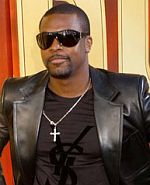Well-known for his trademark rapid-fire wisecracks, actor-comedian Chris Tucker broke into movies in the mid-1990s, following a successful career in stand-up. After his scene-stealing turn in director F. Gary Gray’s 1995 cult comedy hit “Friday,” Tucker took on the role of his career as Jackie Chan’s comic foil and partner in the action-comedy, “Rush Hour” (1998). Thanks to the worldwide success of “Rush Hour,” Tucker became the fastest actor ever to make Hollywood’s elite “$20 Million Club” – a princely sum he received for appearing in the 2001 sequel. Despite wracking up a prolific flurry of credits at the start of his career, Tucker’s output slowed to a trickle by the early 2000s, limiting his film roles strictly to the “Rush Hour” franchise. Nevertheless, the comedian’s star power remained significant enough to once again command a $20 million payday – against 20% of the gross – for his next film, the inevitable “Rush Hour 3” (2007). The youngest of six children born to janitorial business owner Norris Tucker, Christopher Tucker was born in Decatur, GA on Aug. 31, 1972. An incorrigible class clown, Tucker first displayed his gifts in a school talent show, where he proved a roaring success. Heavily influenced by Richard Pryor and Eddie Murphy, Tucker wasted no time kicking off his comedy career. Moving to L.A. right out of high school, Tucker quickly gained a following on the comedy club circuit for his high-pitched delivery and manic energy. The young comic’s on-stage act eventually led him to an appearance on “Def Comedy Jam” (HBO, 1992-97), a cable showcase for rising young black comics.
Tucker made his feature debut in 1993 with a small role in “House Party 3,” but it was his co-starring turn in “Friday” which made his career. Cast in the role of the dope-smoking, underachieving sidekick, Smokey, Tucker completely stole the film out from under its star, Ice Cube. Lensed mostly on location in South Central Los Angeles, the film followed 16 hours in the lives of two friends – Tucker and Cube – as they waste the day away, cracking wise and making observations. A sleeper hit, “Friday” took in over $27 million at the box office and spawned two sequels – neither of which Tucker returned for. That same year, Tucker also had a supporting role in the Hughes Brothers’ urban action-thriller “Dead Presidents.”
The year 1997 proved to be a banner year for Tucker as an actor. In Quentin Tarantino’s “Jackie Brown,” Tucker had a small but pivotal role as Beaumont Livingston, a minor associate of Samuel L. Jackson’s charming gun-runner, Ordell Robbie. Tucker then followed-up with another scene-stealing turn as a futuristic D.J. named Ruby Rhod in director Luc Besson’s $80 million sci-fi/action spectacle, “The Fifth Element.” Hot on a roll, the comedian-turned-actor subsequently signed on to appear in the appropriately titled “Money Talks,” an anemic, derivative comedy co-starring Charlie Sheen.
Continuing his success the following year, Tucker broke the bank in 1998 when he was paired with international action star Jackie Chan in “Rush Hour” – the first of director Brett Ratner’s highly profitable East-meets-West action-comedies. Par for the course, Tucker’s character – the fast-talking, motor-mouthed Detective James Carter – was not much of a departure for the comedian, who essentially played it as another version of his Smokey character. While some criticized the movie for being a “Lethal Weapon” rip-off, “Rush Hour” was a major hit, raking in over $140 million domestically – and nearly double that overseas. Not bad for a flick that only cost New Line Cinema a relatively paltry $35 million.
Surprisingly, just as he was the peak of his box office popularity, Tucker retreated from moviemaking altogether. After turning down several film offers, Tucker finally returned in 2001 for “Rush Hour 2.” Despite a four-year absence from the big screen, Tucker received a much publicized $20 million payday for the sequel. Following the huge success of “Rush Hour 2,” Tucker once again dropped off the radar; this time, for a full six years. While his two self-imposed exiles likely did not help further his career, neither did they particularly hurt it. In fact, to hear Tucker tell it, the sabbaticals may have been just what the comedian needed to keep his grounding. Revealed Tucker in a candid 2003 interview: "When I started traveling, I started finding out around the world [that] people don’t have clean water, how much we’re so spoiled in America because we have so much. It made me stop thinking about myself as much." Traveling to Africa, Tucker saw first-hand the devastation that poverty, AIDS and hunger could inflict. The experience proved life-changing for the actor, who later set up a foundation in his name to help children in Africa attain the basic necessities of life. Thankfully for fans of the Chan-Tucker franchise, in 2007, Tucker returned to reprise his signature role in “Rush Hour 3.” Released in the U.S. on Aug. 10, 2007, the third installment opened at #1, taking in $50.2 million in its opening weekend.



